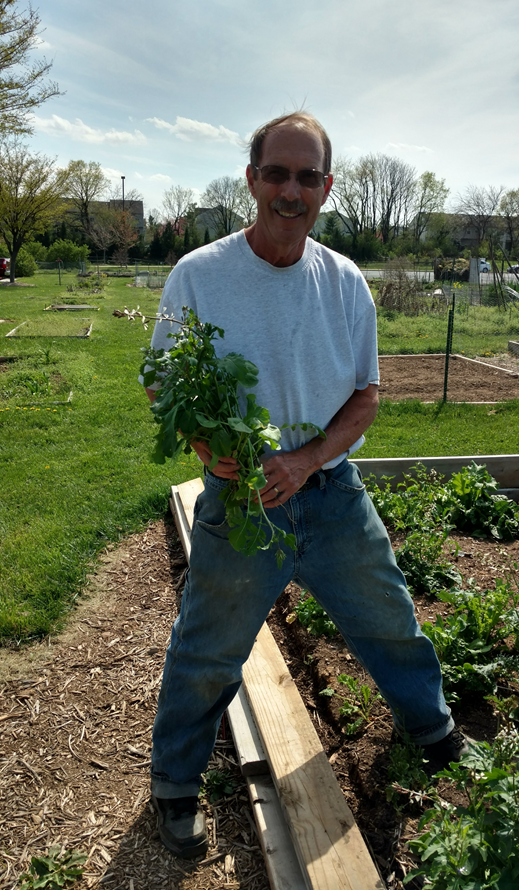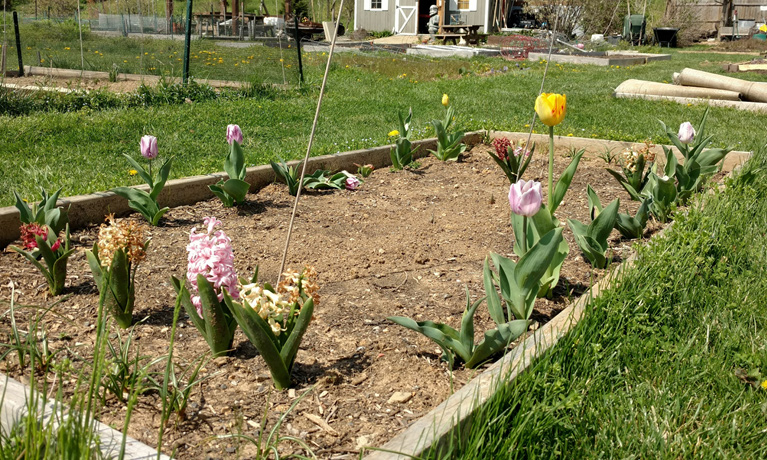From the victory gardens of World War II, when civilians grew the majority of their own food at home to preserve more food for troops, to the science of modern agriculture, there is one aspect of gardening that is enduring: The aspect of community.
In Frederick County, there is no shortage of community gardens. The beginner and seasoned veteran alike come together in one communal space to share their knowledge and information, especially when it comes to growing vegetables.
It’s no surprise the local trend mirrors a national one. In recent years, households that grow their own food increased substantially, along with the percentage of young gardeners. About 35 percent of American households grow their own food, according to statistics from the National Gardening Association. Sixty-three percent of those people are millennials, individuals between the ages of 18 and 34.
At Monocacy Elementary School, Pre-K teaching assistant Erin Kline guides a generation of growers even younger than that.
There is approximately 350 square feet on the school campus where Kline, a former Master gardener, plants and harvests vegetables with the children she teaches. She uses vegetables like lettuce, radishes and green beans in the classroom to nurture an appreciation of nature in the kids, and get a quick snack in at the same time.
“I love for them to be able to eat right from the garden,” Kline said.
An added bonus is the opportunity for children to commune with the outdoors. Monocacy Elementary is a Title-1 school, characterized by low-income students who might not have access to green spaces or backyards. Kline explained the less chance the kids have to be outdoors, the more it benefits them, extending an “opportunity for growing as a person.”
The benefits of the community garden extend beyond the students and into the lives of their parents through evening family plantings at the school and other events. The positive ripple effect of the garden at Monocacy Elementary helped start community gardens at other schools, Kline said, especially with help from Master gardener outreaches.
“The whole inspiration is providing a chance to get connected to nature,” Kline said.

While Kline is raising a young generation of gardeners at Monocacy Elementary, David Muns works as manager at another community garden located outside of The Frederick News-Post. When the garden started in 2009, it was only for employees and held about 30 plots. Now it holds 135 plots that are offered to the public, although there is a waitlist of about five people each year, Muns said. Of the 135 plots, 120 are rented and 15 are reserved for donations for the food bank.
Muns helps to instill a sense of community among people who might not otherwise have the opportunity to garden. Aside from donating to the food bank, the garden also participates in outreach efforts with local nonprofits, such as the Rescue Mission and the Way Station. Participants visit from these organizations and work in the gardens as part of the rehabilitation process.
“A lot of people just love to be in a garden,” Muns said.
Muns also explained the community gardens are rising in popularity because of the variety of ideas tenants are exposed to. Different backgrounds and ethnicities come together in the scope of a single communal space, and provides participants with new inspiration and knowledge. For example, Muns said bitter melon is a green cucumber-esque vegetable in the squash family he never saw before managing the garden at The News-Post.
“When you come out to a community garden,” Muns said. “You see so many new ideas.”
Erin Kline explained community gardens are more than just vegetables and soil. The garden is parallel to life, where plants may fall prey to dangers like temperature, drought or disease. Kline explains each failure and success, like in life, offer opportunities for people from all walks of life to grow as people.
“That’s my hope,” Kline said.

